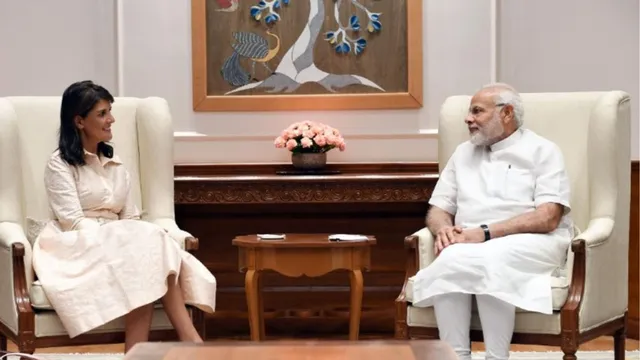- By Supratik Das
- Sun, 24 Aug 2025 01:47 PM (IST)
- Source:JND
Nikki Haley warning on Russian oil imports: Former US ambassador to the United Nations and Republican leader Nikki Haley has warned India over its continued purchase of Russian oil, saying New Delhi must “take President Donald Trump’s concerns seriously” and work with the White House to find a way forward before the situation worsens.
Haley, a close ally of President Trump and among the most prominent Indian-American voices in Washington, posted on X that decades of goodwill between the world’s two largest democracies should provide the basis to overcome the current turbulence in bilateral ties. She stressed that while trade disagreements and Russian oil imports are creating friction, the United States and India must not lose sight of their “shared strategic goal” of countering China’s growing influence.
“India must take Trump’s point over Russian oil seriously, and work with the White House to find a solution. The sooner the better. Decades of friendship and good will between the world’s two largest democracies provide a solid basis to move past the current turbulence,” Haley wrote. “Navigating issues like trade disagreements and Russian oil imports demands hard dialogue. But we should not lose sight of what matters most: our shared goals. To face China, the United States must have a friend in India,” she added.
India must take Trump's point over Russian oil seriously, and work with the White House to find a solution. The sooner the better.
— Nikki Haley (@NikkiHaley) August 23, 2025
Decades of friendship and good will between the world's two largest democracies provide a solid basis to move past the current turbulence.…
Haley’s Warning Comes Amid Tariff Escalation
Haley's comment earlier in Newsweek warned that ties between Washington and New Delhi are “near a breaking point” and stressed that the United States cannot afford to alienate India by treating it as an adversary. She argued that tariff disputes and disagreements over the US role in the India-Pakistan conflict must not be allowed to drive a wedge between two democracies that share long-term security concerns over China.
Haley’s remarks come against the backdrop of escalating trade tensions between Washington and New Delhi. President Trump’s administration recently imposed additional secondary tariffs on India, citing New Delhi’s imports of Russian crude oil and defence equipment, as well as what it described as “unfair trade practices.” India has strongly criticised the move, calling the tariff hike “unfair, unjustified, and unreasonable.”
External Affairs Minister S. Jaishankar, speaking at an international forum, underlined that India will continue to safeguard both its economic independence and its strategic autonomy, even in the face of American pressure. “When it comes to trade, when it comes to the interests of farmers, when it comes to our strategic autonomy, and when it comes to opposition to mediation, this government is very clear. Our positions are firm. If anybody disagrees, please tell the people of India that you do not value their farmers or their autonomy. We do,” Jaishankar said.
Prime Minister Narendra Modi echoed the same in his Independence Day address, declaring that India will “never compromise” on protecting the interests of its farmers, fishermen, and small producers. Without directly naming the United States, Modi said his government is ready to “pay the price” for standing firm on national priorities. “Farmers, fishermen, and cattle rearers are our top priorities. Modi will stand like a wall against any policy that threatens their interests. India will never compromise when it comes to protecting the interests of our farmers,” he said from the Red Fort.
With Trump pressing ahead on tariffs and India doubling down on self-reliance, relations between the two democracies are under visible strain. But Haley’s appeal for dialogue underscores that even within Washington, there is recognition that India remains an indispensable partner if the United States wants to contain Beijing’s global ambitions.
For now, the diplomatic standoff shows no signs of easing. India has made clear that it will not abandon Russian oil imports or compromise on the interests of its farmers, while the White House insists on aligning trade and energy policy with its global sanctions regime. Whether “decades of friendship” can provide the cushion to withstand this turbulence will likely determine the next phase of US-India relations.

